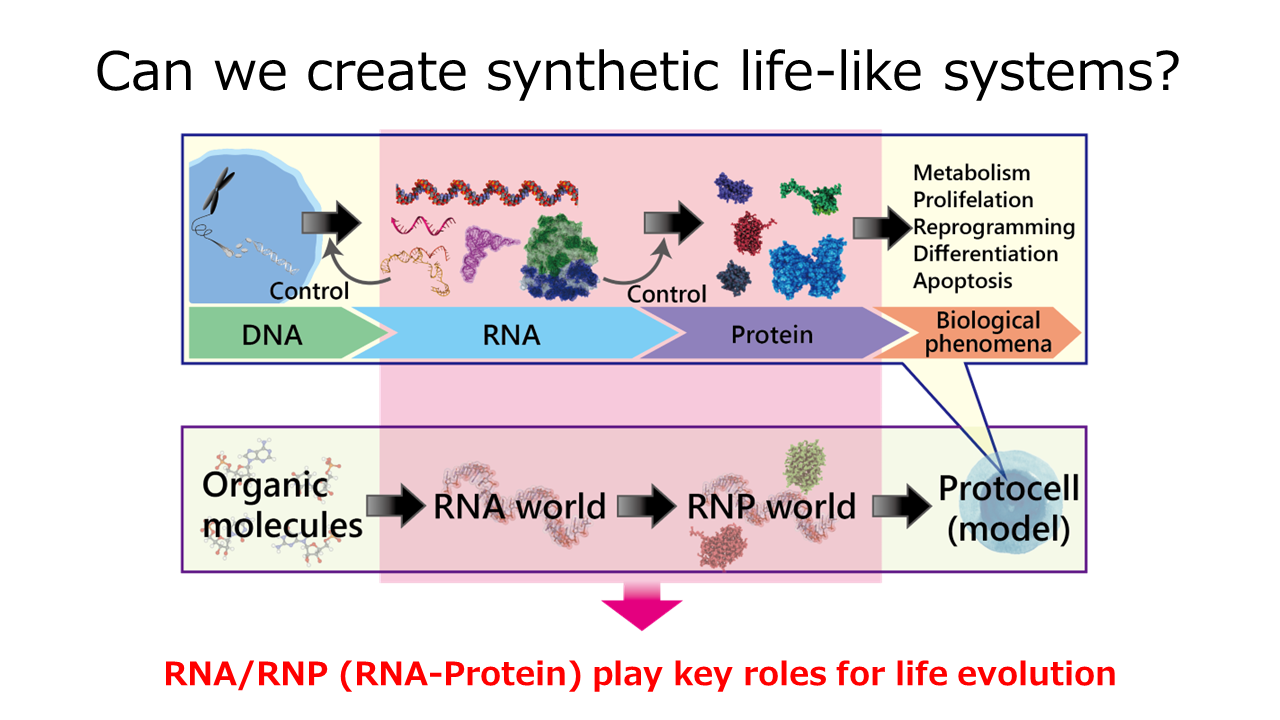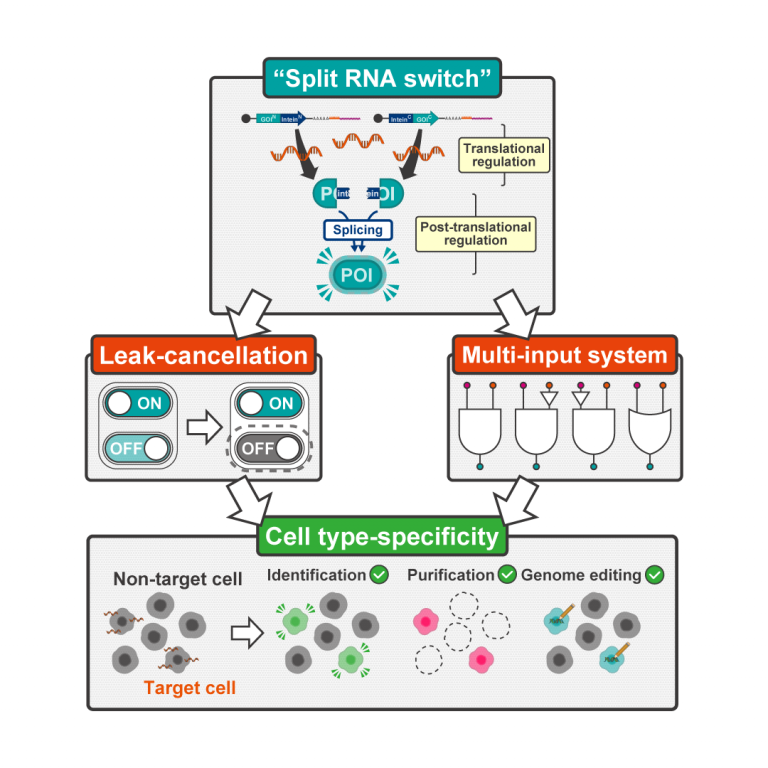Theme
Our laboratory is conducting research on RNA and RNA-protein complexes (RNPs). RNPs play crucial roles in various biological phenomena. By investigating RNPs, we aim to enhance our comprehension of biological systems and uncover novel findings and technologies.
About Research
Expanding the RNA and RNP World through Synthetic Biology and Experimental Evolution
Our laboratory focuses on the study of RNA-protein (RNP) complexes, which are formed when proteins recognize the sequence and structure of RNA. These complexes play a central role in the intracellular molecular mechanisms that control gene expression and subcellular localization. Furthermore, by elucidating the molecular mechanisms of sequences and structures involved in RNP interactions, it may be possible to artificially modify the function and formation of RNA and RNP complexes, thereby manipulating cellular functions at will.
Publication
- Kameda S, Ohno H, and Saito H*: Synthetic circular RNA switches and circuits that control protein expression in mammalian cells, Nucleic Acids Res., 2023, Feb 28;51(4):e24. doi: 10.1093/nar/gkac1252.
- Saito H*: The RNA world “hypothesis”, Nat Rev Mol Cell Biol, 2022 Jul 6. doi: 10.1038/s41580-022-00514-6. PMID: 35794470 (Journal Club)
- Pardi ML, Wu J, Kawasaki S, Saito H*: Synthetic RNA-based post-transcriptional expression control methods and genetic circuits, Advanced Drug Delivery Reviews, 2022 Mar 184:114196. (Review)
- Fujita Y*, Hirosawa M, Hayashi K, Hatani T, Yoshida Y, Yamamoto T, Saito H*: A versatile and robust cell purification system with an RNA-only circuit composed of microRNA-responsive ON and OFF switches, Science Advances., 2022 Jan 7;8(1):eabj1793.
- Nakanishi H, Saito H*: Caliciviral protein-based artificial translational activator for mammalian gene circuits with RNA-only delivery, Nature Communications, 11(1):1297. 2020
- Matsuura S, Ono H, Kuang Y, Kawasaki S, Fujita Y, Saito H*: Synthetic RNA-based logic computation in mammalian cells, Nature Communications, 9(1):4847. doi: 10.1038/s41467-018-07181-2. (2018)
- Shibata T, Fujita Y, Ohno H, Suzuki Y, Hayashi K, Komatsu K.R., Kawasaki S, Hidaka K, Yonehara S, Sugiyama H, Endo M, Saito H*: Protein-Driven RNA Nanostructured Devices That Function in Vitro and Control Mammalian Cell Fate, Nature Communications, 2017 Sep 14;8(1):540. doi: 10.1038/s41467-017-00459-x
- Liliana Wroblewska, Tasuku Kitada, Kei Endo, Velia Siciliano, Breanna Stillo, Saito H*, and Ron Weiss*: Mammalian synthetic circuits with RNA binding proteins for RNA-only delivery, Nature Biotechnology, 2015, 33(8):839-841. doi: 10.1038/nbt.3301. PMID: 26237515
- Hirohisa Ohno, Tetsuhiro Kobayashi, Rinko Kabata, Kei Endo, Takuma Iwasa, Shige Yoshimura, Kunio Takeyasu, Tan Inoue*, and Saito H*: Synthetic RNA-protein complex shaped like an equilateral triangle, Nature Nanotechnology, 6: 116-120. (2011)
- Saito H*, Tetsuhiro Kobayashi, Tomoaki Hara, Yoshihiko Fujita, Karin Hayashi, Rie Furushima, and Tan Inoue*: Synthetic Translational Regulation by an L7Ae-Kink-turn RNP Switch, Nature Chemical Biology, 6: 71-78. (2010)
Hirohide Saito
Professor
Ph.D.
(Graduate School of Engineering, Graduate School of Medicine, Graduate School of Pharmaceutical Sciences)
Yoshihiko Fujita
Project Lecturer
Ph.D.
Tatsuyuki Yoshii
Lecturer
Ph.D.
Hiroki Ono
Research Associate
Ph.D.
Seiichi Hirano
Research Associate
Ph.D.
Shunsuke Sumi
Project Research Associate
Ph.D.
Koki Makino
Project Researcher (JSPS Research Fellow PD)
Ph.D.






